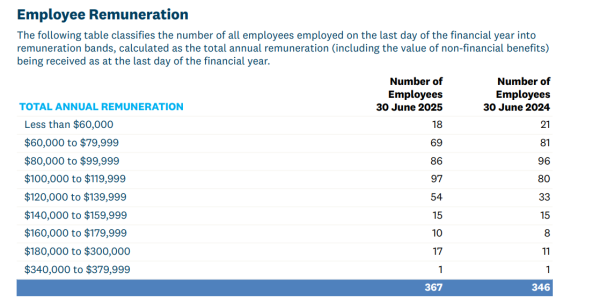Number of $100k+ salaries at ORC revealed


The number of Otago Regional Council staff earning over $100,000 a year has risen by almost a third in the past year.
It’s a figure budding councillors say is “out of step” with both the Otago private sector and the pockets and affordability of Otago ratepayers. The council says those salaries reflect the expectations placed on staff in those positions and it is operating within the salary budget set by Council.
Regional council candidates running under the “Vision Otago” banner shone a light on the staff remuneration outlined in the Annual Report 2024-2025 and before council for adoption today (Sept 24).
The Annual Report shows in the year ending 30 June 2025, 194 of the council’s 367 staff were earning more than $100,000 per year – 53 per cent of staff.
This was up 31 per cent on the year ending 30 June 2025 when 148 of the council’s 346 staff were earning more than $100,000 per year – 43 per cent.
With the rising cost of living, a $100,000 salary doesn’t go as far as it once did. So we also looked at the number of staff earning more than $160,000 per year. This increased 40 per cent from 20 in 2024 to 28 in 2025.
The full breakdown of staff remuneration outlined in the Annual Report is below.

Incumbent councillor Michael Laws, who is running for re-election with Vision Otago, says the report shows the council has “no control of its own costs and that staff numbers and salaries make up the greater proportion”.
He says staff numbers at the council have increased despite the government halting planning progress while it finalises resource management reforms.

- Michael Laws has criticised staff salary increases at ORC.
“It’s the staff salary rises of 5 per cent in 2023/4 and 4.5 per cent in 2024/5, that have had the greatest effect.
“The local government sector moans about having costs imposed upon it, but it never admits that staff salary increases – 9.5 per cent over the past two years at the ORC – is a good part of the equation.
“To put that in perspective, the average private sector wage/salary rise to the year ended March 2025, was 2.6 per cent.”
Earlier this year, incumbent councillor and Vision Otago candidate Gary Kelliher brought a motion to cap staff numbers at 300 FTEs but this failed.
“These figures released today rather prove that the greatest effect upon regional rates is staff numbers and staff salaries,” Kelliher says.
One of the Vision Otago’s policies is to reduce rates through measures including removing automatic salary increases and assessing staffing numbers.
Otago Regional Council chief executive Richard Saunders acknowledged staff costs make up a “significant portion” of the council budget but says salaries reflect the expectations placed on staff in those positions.
He says staff number increases over the past three to five years have been in response to external reviews of the council’s delivery and direction from council to deliver more across several functions including biosecurity, integrated catchment management, consents and compliance.
“Council budgets including staff costs are approved each year through the annual or long-term plan process. Budgets reflect the resources required to deliver the work programme agreed to by Council. The pause on planning work was introduced by the Government after the annual plan budget had been set. Staff have responded by pausing recruitment of a number of vacant roles which is a sensible response to the changes.
“The largest effect on rates in the 2024/25 year was the change in financial strategy to ensure public transport costs were fully funded in the year they occurred along with additional public transport rates to repay historic deficits.”
Saunders says staff salary ranges are set using a commonly-used job evaluation tool called SP10 which determines a suitable salary range for a given position based on several factors and ensures ORC roles are consistent with similar positions in the market. The number of roles earning over $100k would be expected to increase with increases to salary bands, he says.
“We operate within the salary budget set by Council. The salaries paid to staff reflect the expectations placed on those positions. The salaries set through SP10 reflect the remuneration required to recruit and retain staff with the skills and experience required for those roles.”

























